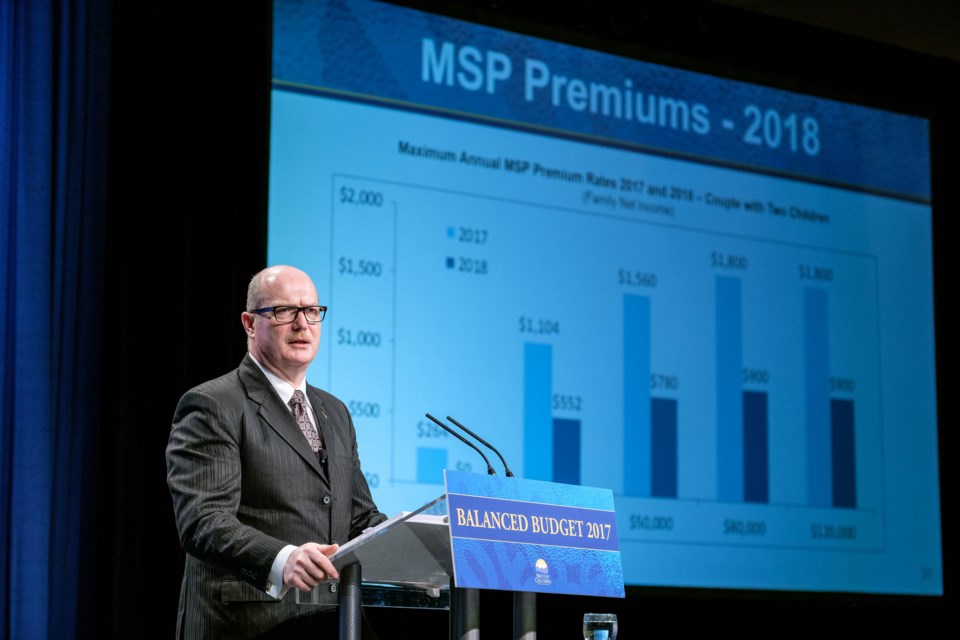The historic left-right debate between spending on services vs. lowering taxes is already playing itself out in Richmond in the lead-up to the May 9 provincial election.
Finance Minister Mike de Jong told the Richmond News his government is focused on growing the economy and lowering taxes, all while presenting balanced operating budgets.
“The vast majority of British Columbians want the government to live within its means. There are some who want to borrow more and more money for services we consume today and then have our children pay for it,” argued de Jong, of the BC Liberals.
Meanwhile, local NDP candidates point out that, in the past four years, not one Richmond school has been seismically upgraded, Richmond Hospital’s north tower has fallen into further disrepair, middle class wages have stagnated and the city’s homeless population has grown.
However, following last month’s budget announcement, one particular policy difference between the two major parties, has emerged — that of Medical Services Plan (MSP).
Using its surplus, de Jong’s government is proposing to cut MSP premiums by half in 2018, for residents earning less than $120,000.
Richmond-Steveston NDP candidate Kelly Greene, on the other hand, said MSP costs should be rolled into general income taxes so people’s health burden is in more accordance with their income.
“I would like to see tax reform that considers the fact that the person who earns $400,000 per year pays the same MSP as a person who earns $40,000 per year,” said Greene, via email.
Rolling the MSP into income taxes (thus not providing a de facto tax cut) would free up money for other services. For instance, the BC Health Coalition wants surplus funds to be directed toward increasing staff levels in seniors care homes, which have declined under the BC Liberal watch.
“Yes, MSP fee reductions will provide some relief for seniors and their families, but without adequate seniors’ services in place, these families will still face major affordability challenges well beyond those posed by MSP fees,” said Adam Lynes-Ford of the Coalition.
Greene also takes aim at de Jong’s insistence that the government is lowering income taxes anyway, considering “flat taxes,” — such as car insurance, utility costs and even those MSP premiums — have gone up beyond inflation over the past four years.
“I believe that taxation should be fair,” said Greene, noting those rate hikes have helped bolster the very surplus that will lower MSP fees.
De Jong claims that a fifth straight balanced budget has put the government in a position to soon eliminate operating debt. However, government-owned corporations carry their own debt, and it is on the rise.
Under the new budget, such debt will go up $6 billion to $30.2 billion by 2019, much of it due to B.C. Hydro’s Site C dam and the Massey Tunnel replacement (funded through a Crown corporation).
The NDP won’t entirely rule out the Massey Tunnel replacement bridge, but favours Metro Vancouver’s transportation plan, which does not support it.
De Jong defends the $3.5 billion Massey bridge decision, claiming it is analogous to the Port Mann Bridge.
“The hundreds of thousands of people that today save an hour, or hour-and-a-half of commute time [on the Port Mann] are very appreciative that government proceeded in the face of criticism . . . and got that project done,” said de Jong.
Furthermore, infrastructure spending will help the economy in the long run, argues De Jong.
But critics have questioned costs and choices.
The Port Mann will, reportedly, not start turning a profit until 2025 now. It sees more traffic than is projected at the Massey crossing and cost less ($3.3 billion) at the time of opening (although it has $407 million in operating debt).
Meanwhile, the budget provides no funding over the next three years for a new hospital tower.
“I can assure you were committed to working with the (Richmond Hospital) Foundation to develop a new hospital tower,” said Richmond Centre MLA Teresa Wat, who stressed that such projects take time and it could be up to seven years until new hospital doors open.
“There are so many hospitals that need replacement and there’s a process in place,” said Wat.
A concept plan has been submitted to the Ministry of Health, noted Wat.
Another sore point for Richmond residents and most parents has been delays in seismic upgrades for 24 schools.
De Jong’s ministry told the News, to date, two schools are in the business case stage.
Other social service demands in Richmond include increasing disability rates in line with inflation. Last year, the lack of increases were protested by members of the Richmond Centre for Disability (last month the government increased the disability subsidy $50. Inclusion BC, states the assistance rate had increased by $120 since 2001.)
Wages are also a concern. This week at Richmond city council, Deanna Ogle, representing the Living Wage for Families Campaign, said many children are living below the poverty line in Richmond. A living wage of about $20 per hour would help alleviate this, she said. The government recently announced minimum wage would increae 50 cents to $11.35, in September.



